A Nutrition Guide for Your Fertility Journey
When trying to conceive, one of the most important—but often overlooked—factors is egg quality. While age plays a natural role, nutrition and lifestyle habits can significantly influence how well your eggs mature and function.
Science now shows that certain vitamins and minerals protect eggs from aging and provide the energy they need to grow, fertilize, and divide. In this guide, we’ll explore the seven most essential nutrients for egg health and the foods that contain them.

What Is “Egg Quality” and Why Does It Matter?
Egg quality refers to how healthy and viable an egg is for fertilization and embryo development. Aging, oxidative stress, and energy imbalances can all reduce this potential. But the good news is: you can support your eggs by giving them the nutrients they need. Two major goals are:
-
-
- Antioxidant protection – to reduce oxidative stress from daily metabolism and aging
- Cellular energy production – to support the mitochondria, which fuel egg development and division
-
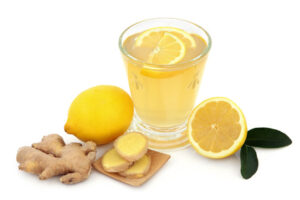
Seven Essential Nutrients to Support Egg Quality
① Antioxidant Vitamins: A, C, and E
These “antioxidant trio” vitamins help shield eggs from oxidative damage.
Vitamin A: Supports cell repair and differentiation (found in liver, eel, carrots, pumpkin)
Vitamin C: Strong antioxidant that protects eggs (red bell pepper, kiwi, broccoli, citrus)
Vitamin E: Improves blood flow and nutrient delivery to the ovaries (almonds, avocado, vegetable oils)
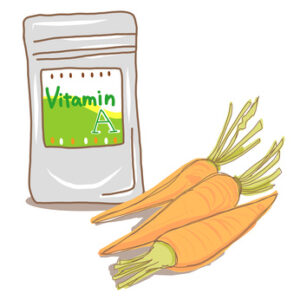
② Coenzyme Q10 (CoQ10)
Crucial for mitochondrial energy production, CoQ10 levels decline with age.
(Foods: sardines, mackerel, pork, beef, peanuts)
③ Iron
Iron is essential for forming red blood cells that carry oxygen to the ovaries. Low iron may impair ovarian function.
(Foods: liver, lean red meat, clams, spinach, kale)
④ Zinc
Zinc plays a central role in hormone regulation and egg maturation.
(Foods: oysters, pork liver, beef, natto, scallops)
⑤ Vitamin D
A hormone-like vitamin that helps maintain ovarian health and supports implantation. It’s also made through sunlight.
(Foods: salmon, sardines, egg yolks, mushrooms)
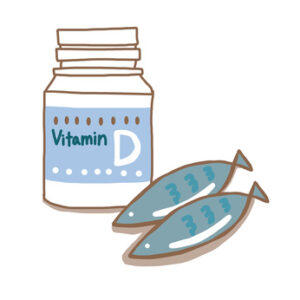
⑥ Folate (Vitamin B9)
Needed for cell regeneration and red blood cell production. Also essential for fetal development in early pregnancy.
(Foods: edamame, asparagus, broccoli, natto, strawberries)
⑦ Protein
Eggs are cells, and cells are made of protein. Protein is vital for hormone production and egg structure.
(Foods: meat, fish, eggs, soy products, dairy)
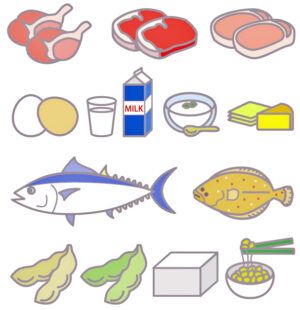
When to Use Supplements (and How to Be Safe)
Some nutrients, such as Vitamin D or CoQ10, are hard to get enough of from diet alone.
Supplements can help—but only when used correctly.
-
-
- Avoid self-diagnosing or taking megadoses without guidance
- Choose high-quality, reputable brands
- Some ingredients (like DHEA or melatonin) should be used only under medical supervision
-
Note: The Japanese Ministry of Health recommends 400μg of folate daily starting at least one month before pregnancy.
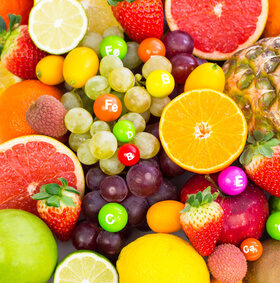
Conclusion: Nutrition Is a Gateway to Fertility
Your fertility journey is a chance to tune into your body and create a healthier internal environment. Starting with whole, balanced meals—such as the “Mago-Wa-Yasashii” Japanese principle (beans, sesame, seaweed, vegetables, fish, mushrooms, potatoes)—can lay a strong foundation.
By focusing on nutrition, you nurture your egg quality and increase your natural chances of conception. Let this be the start of a positive, body-friendly approach to fertility—one step, and one nutrient, at a time.
Your Complete Guide to “Maternity Hands Care” – A Prenatal Therapy in Tokyo
-
- Women’s Fertility & Hormonal Balance
– Irregular periods, low basal temperature, cold sensitivity, visceral tension
- Women’s Fertility & Hormonal Balance
18. Preparing Body and Mind for Conception
19. Supporting Fertility During Treatment
20. Seven Key Nutrients to Boost Egg Quality








